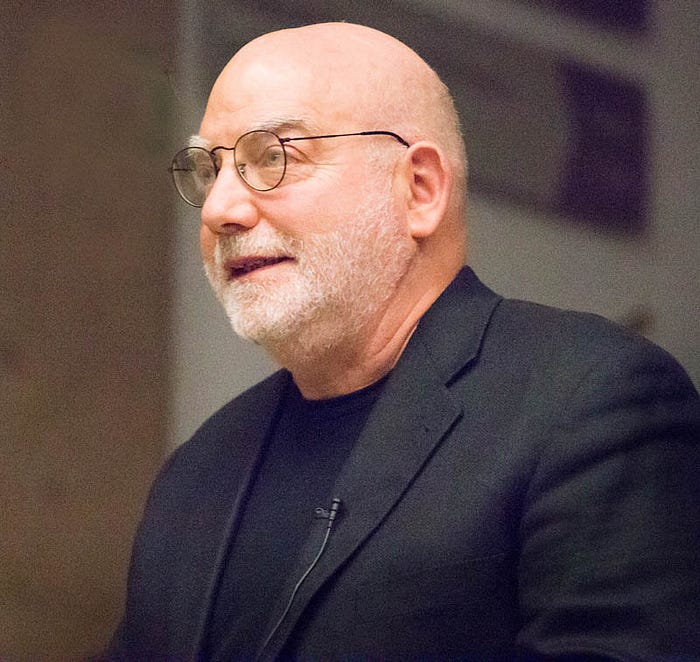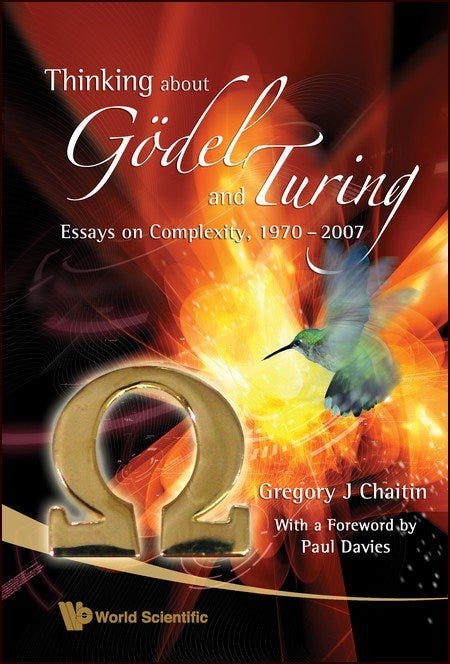Selected Quotes of Gregory Chaitin
Published in
5 min readSep 9, 2023

From Meta Math! The Quest for Omega (2005, Vintage Books)

- Science is an open road: each question you answer raises ten new questions, and much more difficult ones!
- Science is an adventure. I don’t believe in spending years studying the work of others, years learning a complicated field before I can contribute a tiny little bit.
- To discover new mathematics, you have to feel comfortable with vague, unformed, embryonic ideas, even as you try to sharpen them.
- To me, you understand something only if you can program it.
- If the answer is extremely complicated, I think that probably means that we’ve asked the wrong question!
- The essence of math resides in its freedom, in the freedom to create.
- I always hated textbooks. I always hated books full of formulas, dry books with no colorful opinions, with no personality! The books I loved were books where the author’s personality shows through …
- The frontiers of knowledge are nearby, in fact, extremely close.
- There are questions that one asks, and questions that ask themselves!
- If a mathematical statement is false, there will be no proofs, but if it is true, there will be an endless variety of proofs, not just one!
- Mathematical facts are not isolated, they are woven into a vast spider’s web of interconnections.
- Math isn’t the art of answering mathematical questions, it is the art of asking the right questions,
- The real goal of mathematics is to obtain insight, not just proofs.
- A deep and important mathematical result [such as incompleteness] deserved a deep proof that would give deep insight into the “why” of incompleteness, instead of a clever proof that only permitted you to have a superficial understanding of what was going on.
- My instinct was that the original context in which the problem of incompleteness was formulated had to be changed to one that permitted such deeper understanding
- Uncomputability is a deeper reason for incompleteness.
- I’m personally much more interested in general ideas than in details. You just take care of the general ideas, and the details will take care of themselves! Well, not always …
- Nature likes to reuse good ideas.
- Science is searching for the DNA for the Universe!
- For an idea to be successful, you have to give it away, you have to be willing to let other people think that it was theirs!
- Any attempt by a finite mind to apprehend God is inherently paradoxical.
- People were very impressed by the technical difficulty of Gödel’s proof. … But if you change whole numbers to real numbers, and if you talk about what you can name, rather than about what you can prove, then incompleteness is, as we’ve just seen, immediate! In my opinion, this is the best proof of incompleteness!
- Randomness is a slippery concept, there’s something paradoxical about it, it’s hard to grasp. The harder you stare at randomness, the less you see it!
From Thinking About Gödel and Turing (2007, World Scientific)

- The endeavor to define and measure randomness has greatly clarified the significance and the implications of Gödel’s incompleteness theorem. That theorem can now be seen not as an isolated paradox but as a natural consequence of the constraints imposed by information theory.
- The incompleteness phenomenon discovered by Gödel is natural and widespread rather than pathological and unusual.
- So Hilbert’s idea was just an extreme, an exaggerated version of the normal notion of what mathematics is all about: the idea that we can decide and agree on the rules of the game, all of them, once and for all. The big surprise is that it turned out that this could not be done.
- Hilbert turned out to be wrong, but wrong in a tremendously fruitful way, because he had asked a very good question. In fact, by asking this question he actually created an entirely new field of mathematics called metamathematics.
- I don’t think that Hilbert really wanted to turn mathematicians into machines. But the idea was that if you could take mathematics and do it this way, then you could use mathematics to study the power of mathematics. And that is the important new thing that Hilbert came up with.
- Turing’s approach to all these questions is completely different from Gödel’s and much deeper. Because Turing brings it out of the closet! What he brings out of the closet is the computer! The computer was implicit in Gödel’s paper, but this was really not visible to any ordinary mortal, not at that time, only with hindsight. And Turing really brings it out in the open.
- No computer program can tell you in advance if another computer program will eventually halt or not. And the problem is the ones that don’t halt, that’s really the problem. The problem is knowing when to give up.
- So I think that Turing went beyond Gödel, but you have to recognize that Gödel took the first step, and the first step is historically the most difficult one and takes the most courage.
- So I began to think that maybe there’s also randomness in pure mathematics. I began to suspect that maybe that’s the real reason for incompleteness.
- A theory is good to the extent that it compresses the data into a much smaller set of theoretical assumptions. The greater the compression, the better!
- Mathematical truth is an infinite amount of information, but any particular set of axioms just has a finite amount of information … And whenever any statement, any mathematical assertion, involves more information than the amount in those axioms, then it’s very natural that it will escape the ability of those axioms.
- While math and physics are admittedly different, perhaps they are not as different as most people usually believe.

